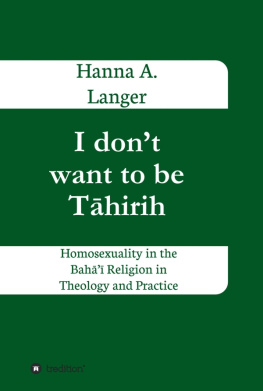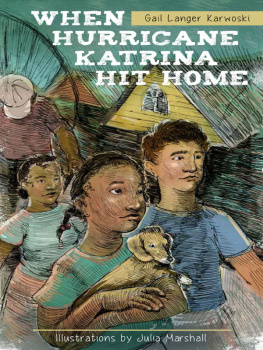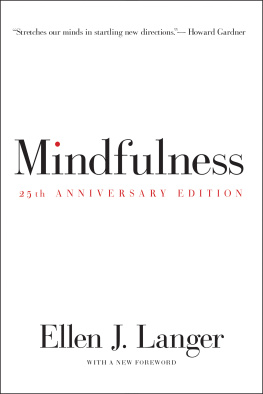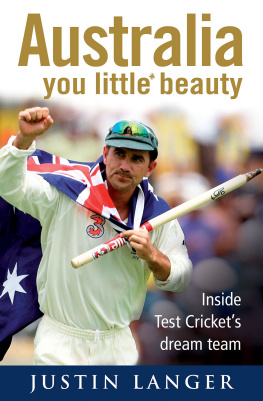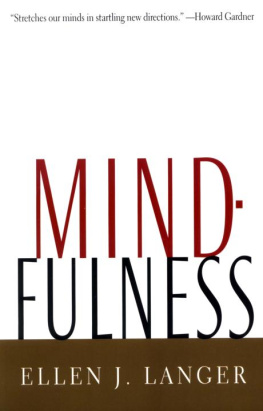Hanna A. Langer - I don’t want to be Tāhirih
Here you can read online Hanna A. Langer - I don’t want to be Tāhirih full text of the book (entire story) in english for free. Download pdf and epub, get meaning, cover and reviews about this ebook. publisher: tredition, genre: Religion. Description of the work, (preface) as well as reviews are available. Best literature library LitArk.com created for fans of good reading and offers a wide selection of genres:
Romance novel
Science fiction
Adventure
Detective
Science
History
Home and family
Prose
Art
Politics
Computer
Non-fiction
Religion
Business
Children
Humor
Choose a favorite category and find really read worthwhile books. Enjoy immersion in the world of imagination, feel the emotions of the characters or learn something new for yourself, make an fascinating discovery.
- Book:I don’t want to be Tāhirih
- Author:
- Publisher:tredition
- Genre:
- Rating:3 / 5
- Favourites:Add to favourites
- Your mark:
- 60
- 1
- 2
- 3
- 4
- 5
I don’t want to be Tāhirih: summary, description and annotation
We offer to read an annotation, description, summary or preface (depends on what the author of the book "I don’t want to be Tāhirih" wrote himself). If you haven't found the necessary information about the book — write in the comments, we will try to find it.
I don’t want to be Tāhirih — read online for free the complete book (whole text) full work
Below is the text of the book, divided by pages. System saving the place of the last page read, allows you to conveniently read the book "I don’t want to be Tāhirih" online for free, without having to search again every time where you left off. Put a bookmark, and you can go to the page where you finished reading at any time.
Font size:
Interval:
Bookmark:

www.tredition.de

www.tredition.de
2014 Hanna A. Langer, geb. Bludau
Lektorat, Korrektorat: Louisa Hezseltine
Verlag: tredition GmbH, Hamburg
ISBN
Paperback: | 978-3-7323-1654-0 |
Hardcover: | 978-3-7323-1655-7 |
e-Book: | 978-3-7323-1656-4 |
Das Werk, einschlielich seiner Teile, ist urheberrechtlich geschtzt. Jede Verwertung ist ohne Zustimmung des Verlages und des Autors unzulssig. Dies gilt insbesondere fr die elektronische oder sonstige Vervielfltigung, bersetzung, Verbreitung und ffentliche Zugnglichmachung.

Ludwig-Maximilians-Universitt Mnchen
Interfakultrer Studiengang Religionswissenschaft
I dont want to be Thirih
Homosexuality in the Bah Religion in Theology and Practice
Wissenschaftliche Arbeit
zur Erlangung des Grades eines Magister Artium (M.A.)
Referent: Prof. Dr. Horst Junginger (Religionswissenschaft)
Koreferentin: Prof. Dr. Paula-Irene Villa (Gendersoziologie)
Vorgelegt von: Hanna A. Langer, geb. Bludau
Mrz 2014
For him,
who inspired me to write this thesis
and
for all other LGBT Bahs
Table of Contents
Preface
Almost all religions have an issue with same-sex relationships. While this is a well-known fact in the history of religions, it has not yet become an object of systematic research. In particular the question as to why religions decline homosexuality. The general male dominance of religion makes it a priori likely that gay activities arouse indignation against their challenging of the religious order of nature attributed to them. Concern for the basic principles of life, especially vis--vis the be gin ning and end of human existence, is probably even more important as to why all forms of sexuality, outside of the religiously sanctioned family and for other reasons than procreation, are met with disapproval. Having sex just for fun appears from a strict religious point of view not only as an evil sin that leads people away from their obedience to gods law but to a contradiction of life itself.
It is, therefore, of little wonder that the dismissal of homosexuality lessens when religions become secularized. Christian westernised denominations have started to allow female clerics to move up to the highest ranks and do not hesitate to approve gay marriages these days. But their orientation towards the world is dearly bought by a decreasing religious impact on the majority of their followers and on society as such. Secularism comes along with the disintegration of traditional family structures and leads to a much greater degree of autonomy and individuality even among religious devotees. In its wake, sexual self-determination has become a matter of course and a positive value proposition shared by many believers as well. On the other hand, fundamentalists and the representatives of an orthodox understanding of religion usually call sexual liberty an expression of decadence and identify it as hotbed of vice. Arent they right, from their point of view, to uphold tradition and to brace themselves against the on-going demise of faith and moral? Isnt it understandable that they reject extramarital sex as an assault against what has been appreciated as good and right on religious grounds for such a long time? For them, the whole spectrum of lesbian, gay, bisexual and transgender (LGBT) conduct emerges as a sign that the end of the world is, indeed, nigh.
Whereas homosexuality causes trouble upon most religions, some even threatening with schism, a scientific occupation with religion and sexuality takes advantage of evading these kinds of internal conflicts. Since the academic study of religion is based on the principle of religious non-involvement, its research objects are transferred from theological discourses and the insiders view to the overarching framework of society, history and culture. Apart from a religious reasoning, it concentrates on historical contexts, on aspects of comparison and on the question of how the behaviour and rationale of religions change under the adjustment pressure they are exposed to. All so-called world religions originate from ancient times and revere Holy Scriptures written in fundamentally different circumstances. It is normal that these texts contain values and customs up to a certain point incompatible with a modern understanding of life. Especially religions without a particular class of theological exegetes like the Bah find it difficult to differentiate in the thicket of a given situation holding clear-cut demarcation lines, which are necessary, even vital, to distinguish between indispensable and non-negotiable doctrines on one side and teachings to be valued non-essential and therefore feasible to modification on the other. To which of these does homosexuality belong to?
The great strength of Hannah A. Langers study is to liberate this question from its religious constraints and to address it on firm scientific grounds. It starts with the observation that even the cosmopolitan and open-minded Bah religion is trapped in an almost insoluble dilemma of tradition and modernity when it comes to sexuality. Traditionalist and contemporary views on normal sexual behaviour differ from each other on a large scale, sometimes to the extent of an insurmountable antagonism. Without ignoring the right of sexual self-determination, as stated, for instance, by the United Nations Human Rights Council, Langer avoids projecting a modern understanding of human sexuality in a backwards manner. She focuses instead on a proper contextualization of same-sex relations by way of close reading the authoritative Bah writings over the course of time. Her profound knowledge both in historical and religious respect enables her to put the problem of sodomy into perspective, permitting new insights into the fundamental difference between the perception of anal intercourse in Persian 19th century and the conclusions of todays gender or queer studies. The Islamic notion liw describes gay relations usually occurring between higher-ranking and young men, often beardless juveniles, which originate from the hegemonic structures of that time. They depended on disparity and dominance and had nothing to do with the idea of an individual human right belonging to all people irrespective of their social and other status. Any literal application of an ancient perception of sodomy to the sexual manners of our time must inevitably lead to problems in its wake. Have religions, when political systems and prevailing opinions change, to follow suit? The answer is Yes and No.
At the end of the last century North American Bah members brought the issue of LGBT rights to the fore. In response, the Universal House of Justice in Haifa published an official communiqu in November 1995 to clarify its position. Though adopting a moderate language, the statement left no doubt about its disapproval of homosexuality. It condemned it as blatant act of immorality, a distortion of human nature and something to be dealt with like a handicap or cured like an illness. The rationale of this declaration was a religious one, being also applied to the argument that a rejection of homosexuality would not imply a rejection of homosexuals. However, what the Bah leadership might have intended as a compromise, fails to gratify those Bahs, who want to be gay and regular members at the same time without impairment of their established rights. In the second part of her study Langer gives an illustrating description of the problems and harm caused by the ex cathedra pronouncement of the Universal House of Justice. Since an honest religious commitment always affects social relations and is closely linked with cultural, political, economic and many other matters, the suggested splitting of religion and sexuality would, if embraced, unavoidably damage a persons life and integrity. Leaving a community that has proven to be important in numerous regards, surely causes pain, distress and cognitive dissonance. The same holds true for gay Bahs remaining under these circumstances.
Next pageFont size:
Interval:
Bookmark:
Similar books «I don’t want to be Tāhirih»
Look at similar books to I don’t want to be Tāhirih. We have selected literature similar in name and meaning in the hope of providing readers with more options to find new, interesting, not yet read works.
Discussion, reviews of the book I don’t want to be Tāhirih and just readers' own opinions. Leave your comments, write what you think about the work, its meaning or the main characters. Specify what exactly you liked and what you didn't like, and why you think so.

